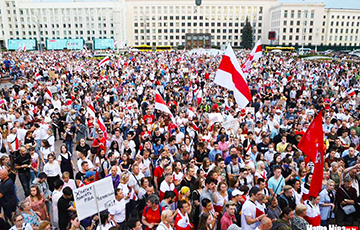Singing Revolution
2- MIKHAIL KALUZHSKY
- 31.10.2020, 17:03
- 24,772

It is impossible to imagine what is happening in Belarus without music playing there.
The Bolshoi Theater is closed, and layoffs have begun. According to the official version, the work of the theater has been suspended due to the epidemiological situation. But in reality, the artists are being fired because on October 27, before the start of Rimsky-Korsakov's opera The Tsar's Bride, the choir sang a spiritual hymn, an appeal to God with a request to make the country and people happy. This vocal piece was banned during the Soviet era; today, it has become a symbol of protest.
Oh, yes, of course, this is not the Bolshoi Theater that is in Moscow on Teatralnaya Square. This is the Bolshoi Theater on the square of the Paris Commune. In Minsk. Until now, artists in Russia did not allow themselves to use the stage for political protest - neither in 2011-2012 nor later, there were only isolated manifestations of solidarity during the Platform case.
Now let's dream about the impossible and imagine for a moment that the artists of the Bolshoi - or some not very large Russian - theater perform a song of protest or solidarity from the stage. What will it be? "Change, we are waiting for change" or "The Walls Will Fall Down" by Lluís Llach in the version of the band Arkady Kots? "Everything is going according to plan" by Grazhdanskaya Oborona? But you can't sing it from the stage. "And the fight continues again," as Yegor Letov once sang with the National Bolsheviks? But Lenin, so young, could not and will never be able to be the image that unites everyone. In a strange way, the Russian protests were - and are - surprisingly unmusical because it is not clear what to sing together.
There are no unifying songs, just as there is no anthem alternative to Mikhalkov-Putin. Of course, this is not a problem with music. This is an identity problem. Support in the past cannot be found without slipping into imperialism - however, it has not gone anywhere yet. The energy of resistance of Russian rock remained in those times when it was struggling with an era that seemed to be leaving, but successfully reborn into new forms. So we still want changes, like Viktor Tsoi in 1987 and like Nadezhda Kadysheva in modern times.
But let's not compare the incomparable. Let's return to Belarus, where a society, not burdened by the imperial past and present, creates a civil nation. Probably Heinz Valk, the Estonian artist who coined the expression "singing revolution" in June 1988, did not expect that the same principles of peaceful protest would be used more than 40 years later outside Lithuania, Latvia, and Estonia. And what is happening in Belarus is impossible to imagine without the music playing there. The variety of these songs, from lofty pathos to satire, is an indicator of how multi-component and heterogeneous this protest is. And that's why he has a future.
The Belarusians have at least two alternative national anthem - the prayer "Magutny Bozha" ("Almighty God," it was sung in the Minsk Bolshoi Theater) and "Pahonia," which refers to the history and memory of the lost statehood. The sarcastic rock-n-roll "Three Turtles" by Lyavon Volsky is regularly played at the protests - in a sense, the opposite of Tsoi's "We are waiting for change": "You don't wait, there will be no surprises, no one is waiting, and you don't wait." But at the same time, the protesters sing both "Changes" and "Razbury Turmy Mury" - the Belarusian version of "The Walls Will Fall Down" translated by Andrei Khadanovich.
Finally, one of the protest results was the grandiose prank of the dismissed actors of the Minsk Kupala Theater - "Shchuchynshchyna," an unusually popular parody of a "patriotic" pop video. A singer with a red-green flag on her shirt sings to the electronic "umtsa-umtsa": "I don't need other countries, to live here is the best reward, here the names of the villages are pleasing to the ear: Hurnofel, Zhaludok, and Liady-Liady-Liady." This already reminds us not so much of the "singing revolution" in the Baltic countries as of the actions of the Polish "Orange Alternative" during the protests of "Solidarity."
And this is one more argument against the Russian-Belarusian analogies. Belarus, where protests find their place both in squares and on stages, demonstrates an extraordinary ability to sing together.
Mikhail Kaluzhsky, Grani









